Chip Interfaces, Implementations, Schematics
Given / Primitive (2 Gates)
- Nand
- DFF
Provided (5 Chips)
ARegister
/**
* A 16-Bit register called "A Register".
* If load[t-1]=1 then out[t] = in[t-1]
* else out does not change (out[t] = out[t-1])
*
* This built-in chip implementation has the side effect of
* providing a GUI representation of a 16-bit register
* called "A register" (typically used to store an address).
*/
CHIP ARegister {
IN in[16], load;
OUT out[16];
BUILTIN ARegister;
CLOCKED in, load;
}DRegister
/**
* A 16-Bit register called "D Register".
* If load[t-1]=1 then out[t] = in[t-1]
* else out does not change (out[t] = out[t-1])
*
* This built-in chip implementation has the side effect of
* providing a GUI representation of a 16-bit register
* called "D register" (typically used to store data).
*/
CHIP DRegister {
IN in[16], load;
OUT out[16];
BUILTIN DRegister;
CLOCKED in, load;
}ROM32K
/**
* Read-Only memory (ROM) of 16K registers, each 16-bit wide.
* The chip is designed to facilitate data read, as follows:
* out(t) = ROM32K[address(t)](t)
* In words: the chip always outputs the value stored at the
* memory location specified by address.
*
* The built-in chip implementation has a GUI side-effect,
* showing an array-like component that displays the ROM's
* contents. The ROM32K chip is supposed to be pre-loaded with
* a machine language program. To that end, the built-in chip
* implementation also knows how to handle the "ROM32K load Xxx"
* script command, where Xxx is the name of a text file containing
* a program written in the Hack machine language. When the
* simulator encounters such a command in a test script, the code
* found in the file is loaded into the simulated ROM32K unit.
*/
CHIP ROM32K {
IN address[15];
OUT out[16];
BUILTIN ROM32K;
}Screen
/**
* The Screen (memory map).
* Functions exactly like a 16-bit 8K RAM:
* 1. out(t)=Screen[address(t)](t)
* 2. If load(t-1) then Screen[address(t-1)](t)=in(t-1)
*
* The built-in chip implementation has the side effect of continuously
* refreshing a visual 256 by 512 black-and-white screen, simulated
* by the simulator. Each row in the visual screen is represented
* by 32 consecutive 16-bit words, starting at the top left corner
* of the visual screen. Thus the pixel at row r from the top and
* column c from the left (0<=r<=255, 0<=c<=511) reflects the c%16
* bit (counting from LSB to MSB) of the word found in
* Screen[r*32+c/16].
*/
CHIP Screen {
IN in[16], // what to write
load, // write-enable bit
address[13]; // where to read/write
OUT out[16]; // Screen value at the given address
BUILTIN Screen;
CLOCKED in, load;
}Keyboard
/**
* The keyboard (memory map).
* Outputs the code of the currently pressed key.
*
* The built-in chip implementation has two side effects supplied
* by the simulator. First, the keyboard memory map is continuously
* being refreshed from the physical keyboard unit. Second, it
* displays a keyboard icon and data entry GUI.
*/
CHIP Keyboard {
OUT out[16]; // The ASCII code of the pressed key,
// or 0 if no key is currently pressed,
// or one the special codes listed in Figure 5.5.
BUILTIN Keyboard;
}Boolean Logic (15 Gates)
Not
/**
* Not gate:
* out = not in
*/
CHIP Not {
IN in;
OUT out;
PARTS:
Nand (a=in, b=in, out=out);
}
And
/**
* And gate:
* out = 1 if (a == 1 and b == 1)
* 0 otherwise
*/
CHIP And {
IN a, b;
OUT out;
PARTS:
Nand (a=a, b=b, out=w1);
Not (in=w1, out=out);
}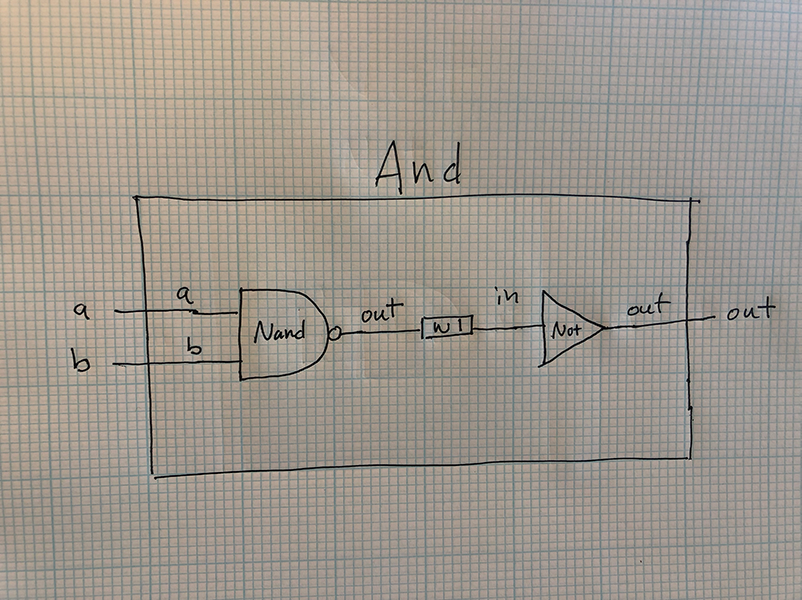
Or
/**
* Or gate:
* out = 1 if (a == 1 or b == 1)
* 0 otherwise
*/
CHIP Or {
IN a, b;
OUT out;
PARTS:
Not (in=a, out=w1);
Not (in=b, out=w2);
And (a=w1, b=w2, out=w3);
Not (in=w3, out=out);
}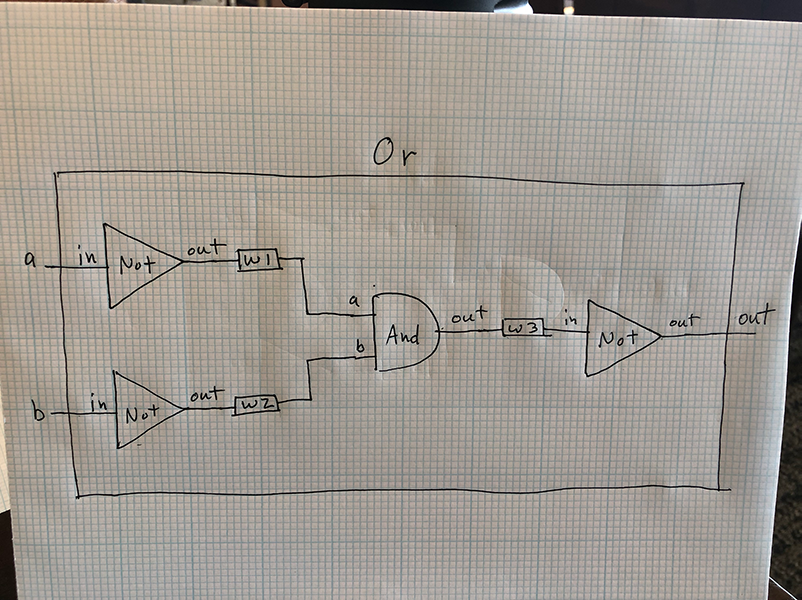
Xor
/**
* Exclusive-or gate:
* out = not (a == b)
*/
CHIP Xor {
IN a, b;
OUT out;
PARTS:
Not (in=b, out=w1);
Not (in=a, out=w2);
And (a=a, b=w1, out=w3);
And (b=b, a=w2, out=w4);
Or (a=w3, b=w4, out=out);
}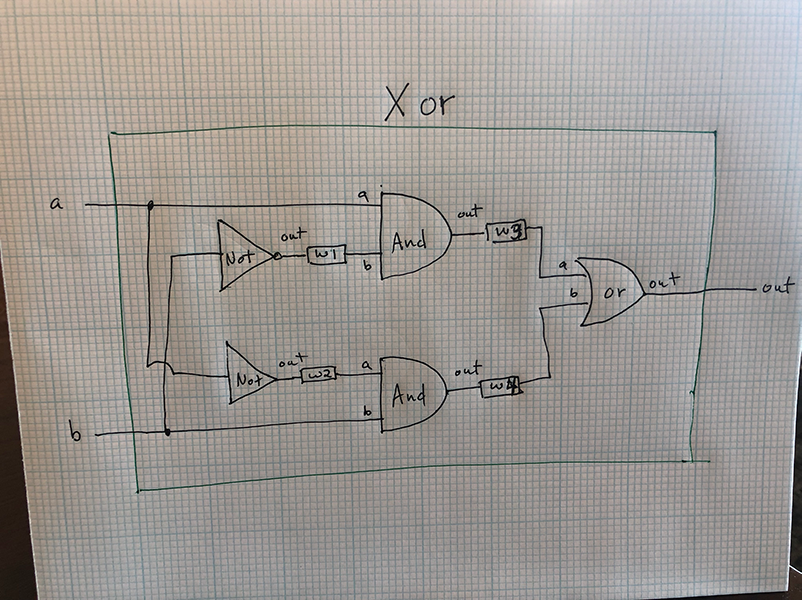
Mux
/**
* Multiplexor:
* out = a if sel == 0
* b otherwise
*/
CHIP Mux {
IN a, b, sel;
OUT out;
PARTS:
// Inverted DMux
Not (in=sel, out=w1);
And (a=a, b=w1, out=w2);
And (a=sel, b=b, out=w3);
Or (a=w2, b=w3, out=out);
}
DMux
/**
* Demultiplexor:
* {a, b} = {in, 0} if sel == 0
* {0, in} if sel == 1
*/
// API
// DMux(in= ,sel= ,a= ,b= );
CHIP DMux {
IN in, sel;
OUT a, b;
PARTS:
Not (in=sel, out=w1);
And (a=in, b=w1, out=a);
And (a=in, b=sel, out=b);
}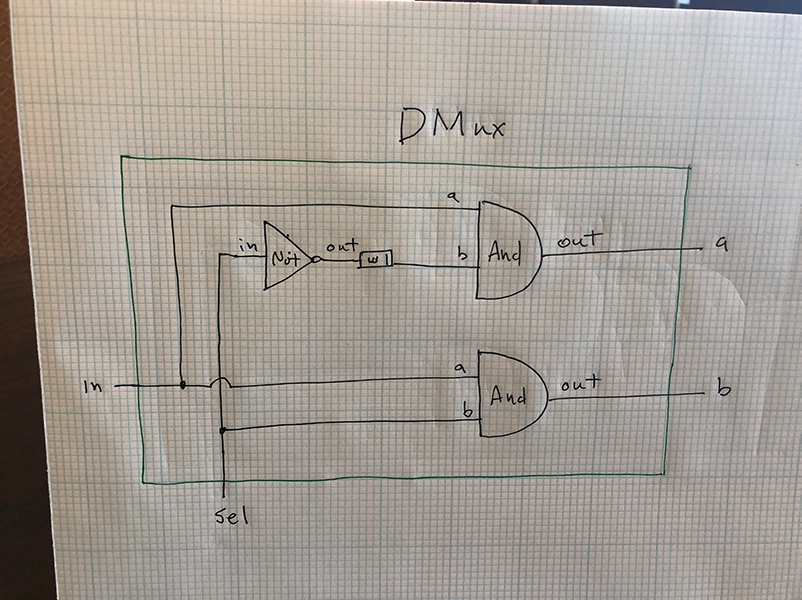
Not16
CHIP Not16 {
IN in[16];
OUT out[16];
PARTS:
Not (in=in[0], out=out[0]);
Not (in=in[1], out=out[1]);
Not (in=in[2], out=out[2]);
Not (in=in[3], out=out[3]);
Not (in=in[4], out=out[4]);
Not (in=in[5], out=out[5]);
Not (in=in[6], out=out[6]);
Not (in=in[7], out=out[7]);
Not (in=in[8], out=out[8]);
Not (in=in[9], out=out[9]);
Not (in=in[10], out=out[10]);
Not (in=in[11], out=out[11]);
Not (in=in[12], out=out[12]);
Not (in=in[13], out=out[13]);
Not (in=in[14], out=out[14]);
Not (in=in[15], out=out[15]);
}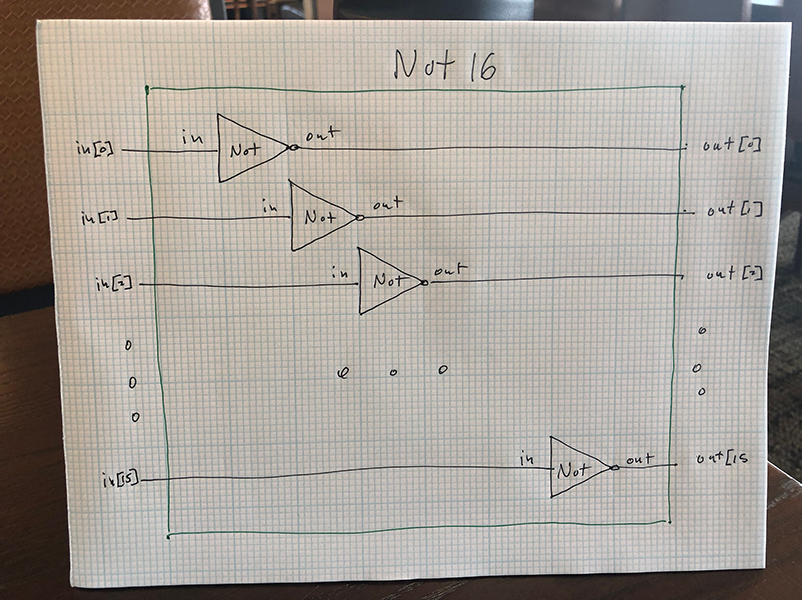
And16
/**
* 16-bit Not:
* for i=0..15: out[i] = not in[i]
*/
CHIP Not16 {
IN in[16];
OUT out[16];
PARTS:
Not (in=in[0], out=out[0]);
Not (in=in[1], out=out[1]);
Not (in=in[2], out=out[2]);
Not (in=in[3], out=out[3]);
Not (in=in[4], out=out[4]);
Not (in=in[5], out=out[5]);
Not (in=in[6], out=out[6]);
Not (in=in[7], out=out[7]);
Not (in=in[8], out=out[8]);
Not (in=in[9], out=out[9]);
Not (in=in[10], out=out[10]);
Not (in=in[11], out=out[11]);
Not (in=in[12], out=out[12]);
Not (in=in[13], out=out[13]);
Not (in=in[14], out=out[14]);
Not (in=in[15], out=out[15]);
}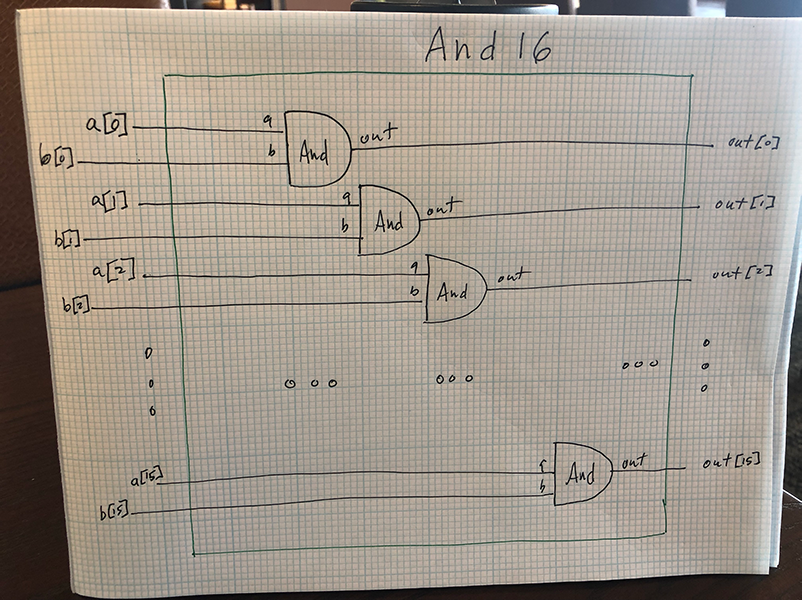
Or16
/**
* 16-bit bitwise Or:
* for i = 0..15 out[i] = (a[i] or b[i])
*/
CHIP Or16 {
IN a[16], b[16];
OUT out[16];
PARTS:
Or (a=a[0], b=b[0], out=out[0]);
Or (a=a[1], b=b[1], out=out[1]);
Or (a=a[2], b=b[2], out=out[2]);
Or (a=a[3], b=b[3], out=out[3]);
Or (a=a[4], b=b[4], out=out[4]);
Or (a=a[5], b=b[5], out=out[5]);
Or (a=a[6], b=b[6], out=out[6]);
Or (a=a[7], b=b[7], out=out[7]);
Or (a=a[8], b=b[8], out=out[8]);
Or (a=a[9], b=b[9], out=out[9]);
Or (a=a[10], b=b[10], out=out[10]);
Or (a=a[11], b=b[11], out=out[11]);
Or (a=a[12], b=b[12], out=out[12]);
Or (a=a[13], b=b[13], out=out[13]);
Or (a=a[14], b=b[14], out=out[14]);
Or (a=a[15], b=b[15], out=out[15]);
}
Mux16
/**
* 16-bit multiplexor:
* for i = 0..15 out[i] = a[i] if sel == 0
* b[i] if sel == 1
*/
CHIP Mux16 {
IN a[16], b[16], sel;
OUT out[16];
PARTS:
Mux (a=a[0], b=b[0], sel=sel, out=out[0]);
Mux (a=a[1], b=b[1], sel=sel, out=out[1]);
Mux (a=a[2], b=b[2], sel=sel, out=out[2]);
Mux (a=a[3], b=b[3], sel=sel, out=out[3]);
Mux (a=a[4], b=b[4], sel=sel, out=out[4]);
Mux (a=a[5], b=b[5], sel=sel, out=out[5]);
Mux (a=a[6], b=b[6], sel=sel, out=out[6]);
Mux (a=a[7], b=b[7], sel=sel, out=out[7]);
Mux (a=a[8], b=b[8], sel=sel, out=out[8]);
Mux (a=a[9], b=b[9], sel=sel, out=out[9]);
Mux (a=a[10], b=b[10], sel=sel, out=out[10]);
Mux (a=a[11], b=b[11], sel=sel, out=out[11]);
Mux (a=a[12], b=b[12], sel=sel, out=out[12]);
Mux (a=a[13], b=b[13], sel=sel, out=out[13]);
Mux (a=a[14], b=b[14], sel=sel, out=out[14]);
Mux (a=a[15], b=b[15], sel=sel, out=out[15]);
}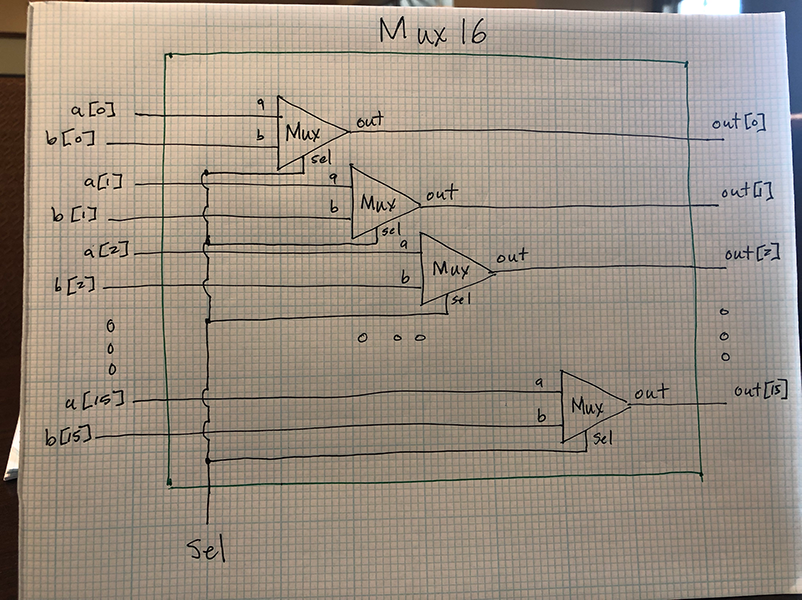
Or8Way
/**
* 8-way Or:
* out = (in[0] or in[1] or ... or in[7])
*/
CHIP Or8Way {
IN in[8];
OUT out;
PARTS:
Or (a=in[0], b=in[1], out=w1);
Or (a=w1, b=in[2], out=w2);
Or (a=w2, b=in[3], out=w3);
Or (a=w3, b=in[4], out=w4);
Or (a=w4, b=in[5], out=w5);
Or (a=w5, b=in[6], out=w6);
Or (a=w6, b=in[7], out=out);
}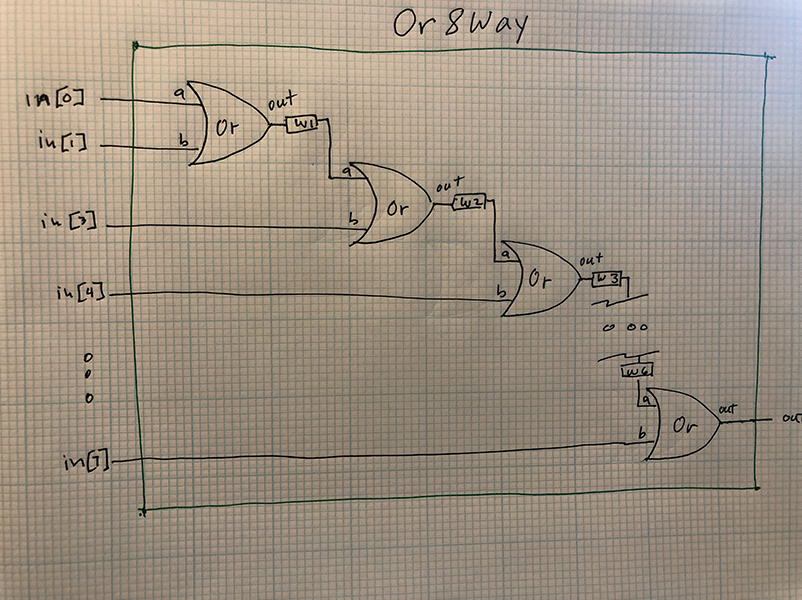
Mux4Way16
/**
* 4-way 16-bit multiplexor:
* out = a if sel == 00
* b if sel == 01
* c if sel == 10
* d if sel == 11
*/
CHIP Mux4Way16 {
IN a[16], b[16], c[16], d[16], sel[2];
OUT out[16];
PARTS:
Mux16 (a=a, b=b, sel=sel[0], out=w1);
Mux16 (a=c, b=d, sel=sel[0], out=w2);
Mux16 (a=w1, b=w2, sel=sel[1], out=out);
}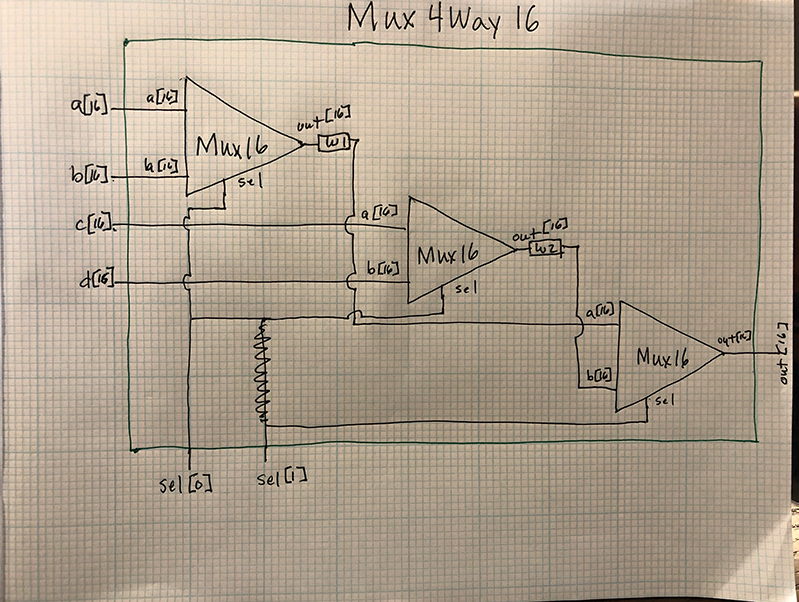
Mux8Way16
/**
* 8-way 16-bit multiplexor:
* out = a if sel == 000
* b if sel == 001
* etc.
* h if sel == 111
*/
CHIP Mux8Way16 {
IN a[16], b[16], c[16], d[16],
e[16], f[16], g[16], h[16],
sel[3];
OUT out[16];
PARTS:
Mux16 (a=a, b=b, sel=sel[0], out=w1);
Mux16 (a=c, b=d, sel=sel[0], out=w2);
Mux16 (a=e, b=f, sel=sel[0], out=w3);
Mux16 (a=g, b=h, sel=sel[0], out=w4);
Mux16 (a=w1, b=w2, sel=sel[1], out=w5);
Mux16 (a=w3, b=w4, sel=sel[1], out=w6);
Mux16 (a=w5, b=w6, sel=sel[2], out=out);
}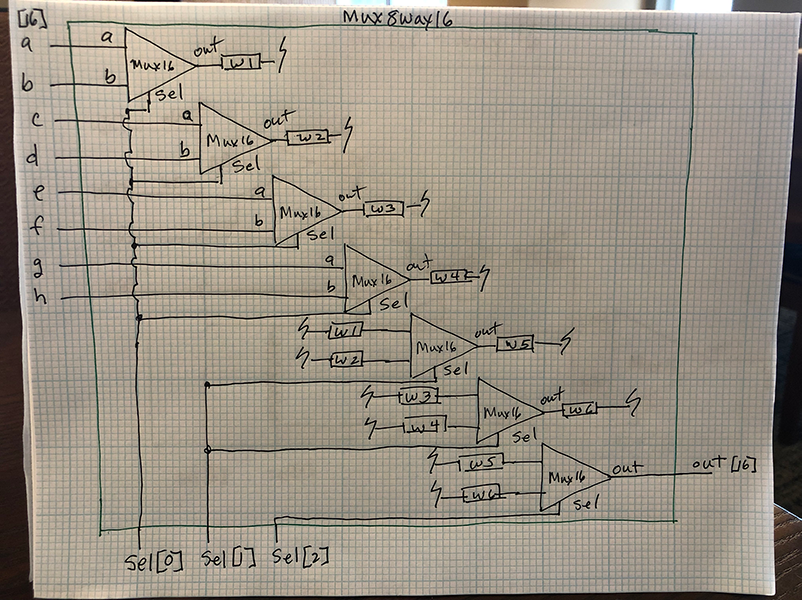
DMux4Way
/**
* 4-way demultiplexor:
* {a, b, c, d} = {in, 0, 0, 0} if sel == 00
* {0, in, 0, 0} if sel == 01
* {0, 0, in, 0} if sel == 10
* {0, 0, 0, in} if sel == 11
*/
CHIP DMux4Way {
IN in, sel[2];
OUT a, b, c, d;
PARTS:
DMux (in=in, a=w1, b=w2, sel=sel[1]);
DMux (in=w1, a=a, b=b, sel=sel[0]);
DMux (in=w2, a=c, b=d, sel=sel[0]);
}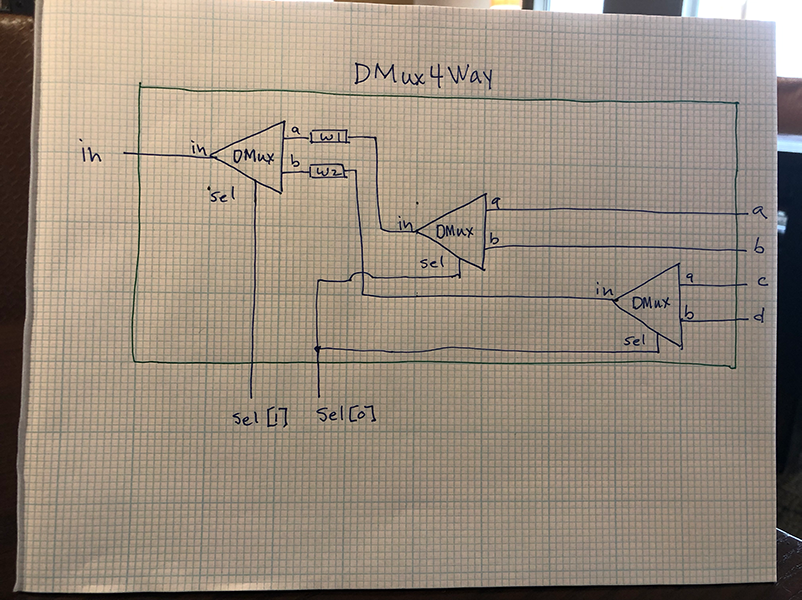
DMux8Way
/**
* 8-way demultiplexor:
* {a, b, c, d, e, f, g, h} = {in, 0, 0, 0, 0, 0, 0, 0} if sel == 000
* {0, in, 0, 0, 0, 0, 0, 0} if sel == 001
* etc.
* {0, 0, 0, 0, 0, 0, 0, in} if sel == 111
*/
CHIP DMux8Way {
IN in, sel[3];
OUT a, b, c, d, e, f, g, h;
PARTS:
DMux (in=in, a=w1, b=w2, sel=sel[2]);
DMux (in=w1, a=w3, b=w4, sel=sel[1]);
DMux (in=w2, a=w5, b=w6, sel=sel[1]);
DMux (in=w3, a=a, b=b, sel=sel[0]);
DMux (in=w4, a=c, b=d, sel=sel[0]);
DMux (in=w5, a=e, b=f, sel=sel[0]);
DMux (in=w6, a=g, b=h, sel=sel[0]);
}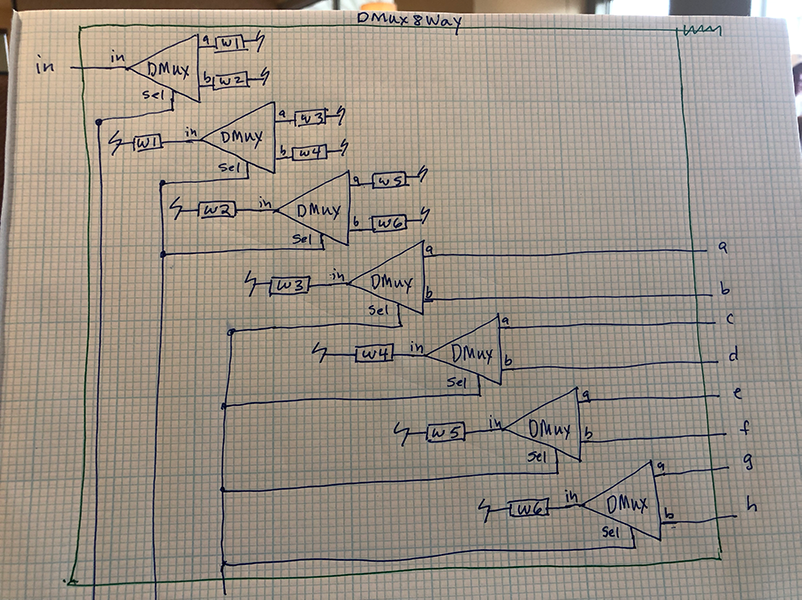
Boolean Arithmetic (5 Chips)
HalfAdder
/**
* Computes the sum of two bits.
*/
CHIP HalfAdder {
IN a, b; // 1-bit inputs
OUT sum, // Right bit of a + b
carry; // Left bit of a + b
PARTS:
Xor(a=a, b=b, out=sum);
And(a=a, b=b, out=carry);
}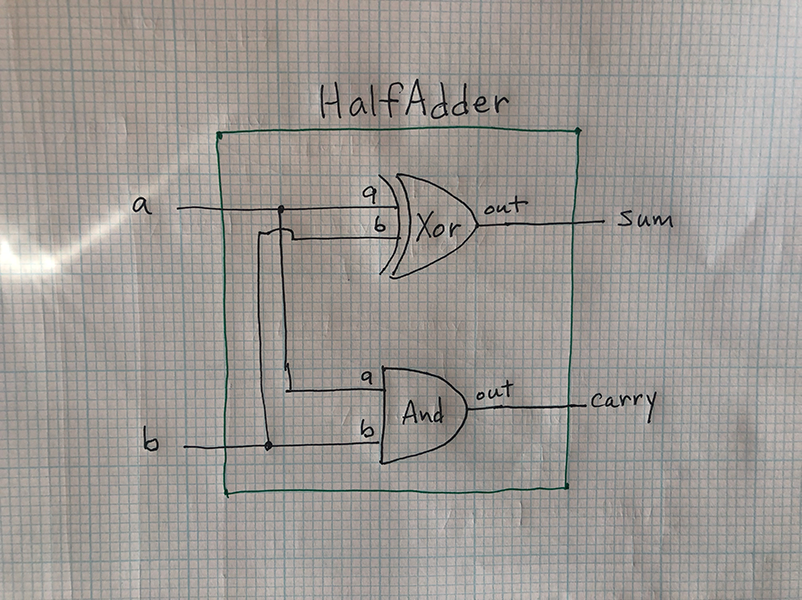
FullAdder
/**
* Computes the sum of three bits.
*/
CHIP FullAdder {
IN a, b, c; // 1-bit inputs
OUT sum, // Right bit of a + b + c
carry; // Left bit of a + b + c
PARTS:
HalfAdder(a=a, b=b, sum=w1, carry=w2);
HalfAdder(a=w1, b=c, sum=sum, carry=w3);
HalfAdder(a=w2, b=w3, sum=carry, carry=false);
}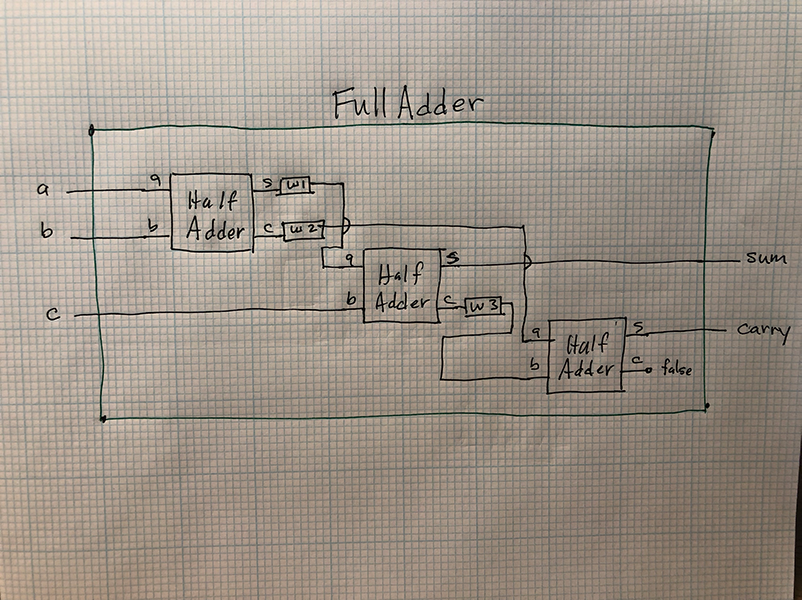
Add16
/**
* Adds two 16-bit values.
* The most significant carry bit is ignored.
*/
CHIP Add16 {
IN a[16], b[16];
OUT out[16];
PARTS:
HalfAdder(a=a[0], b=b[0], sum=out[0], carry=c1);
FullAdder(a=a[1], b=b[1], c=c1, sum=out[1], carry=c2);
FullAdder(a=a[2], b=b[2], c=c2, sum=out[2], carry=c3);
FullAdder(a=a[3], b=b[3], c=c3, sum=out[3], carry=c4);
FullAdder(a=a[4], b=b[4], c=c4, sum=out[4], carry=c5);
FullAdder(a=a[5], b=b[5], c=c5, sum=out[5], carry=c6);
FullAdder(a=a[6], b=b[6], c=c6, sum=out[6], carry=c7);
FullAdder(a=a[7], b=b[7], c=c7, sum=out[7], carry=c8);
FullAdder(a=a[8], b=b[8], c=c8, sum=out[8], carry=c9);
FullAdder(a=a[9], b=b[9], c=c9, sum=out[9], carry=c10);
FullAdder(a=a[10], b=b[10], c=c10, sum=out[10], carry=c11);
FullAdder(a=a[11], b=b[11], c=c11, sum=out[11], carry=c12);
FullAdder(a=a[12], b=b[12], c=c12, sum=out[12], carry=c13);
FullAdder(a=a[13], b=b[13], c=c13, sum=out[13], carry=c14);
FullAdder(a=a[14], b=b[14], c=c14, sum=out[14], carry=c15);
FullAdder(a=a[15], b=b[15], c=c15, sum=out[15], carry=false);
}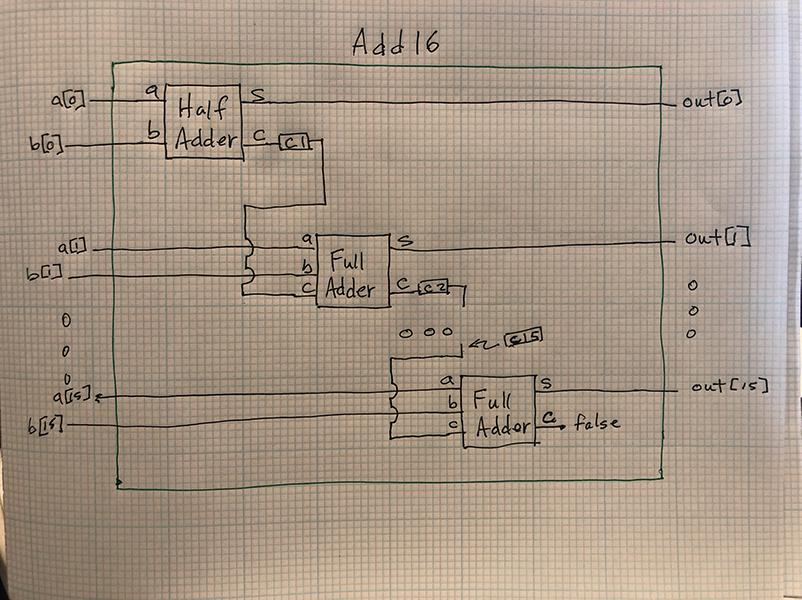
Inc16
/**
* 16-bit incrementer:
* out = in + 1 (arithmetic addition)
*/
CHIP Inc16 {
IN in[16];
OUT out[16];
PARTS:
HalfAdder(a=in[0], b=true, sum=out[0], carry=c0);
HalfAdder(a=in[1], b=c0, sum=out[1], carry=c1);
HalfAdder(a=in[2], b=c1, sum=out[2], carry=c2);
HalfAdder(a=in[3], b=c2, sum=out[3], carry=c3);
HalfAdder(a=in[4], b=c3, sum=out[4], carry=c4);
HalfAdder(a=in[5], b=c4, sum=out[5], carry=c5);
HalfAdder(a=in[6], b=c5, sum=out[6], carry=c6);
HalfAdder(a=in[7], b=c6, sum=out[7], carry=c7);
HalfAdder(a=in[8], b=c7, sum=out[8], carry=c8);
HalfAdder(a=in[9], b=c8, sum=out[9], carry=c9);
HalfAdder(a=in[10], b=c9, sum=out[10], carry=c10);
HalfAdder(a=in[11], b=c10, sum=out[11], carry=c11);
HalfAdder(a=in[12], b=c11, sum=out[12], carry=c12);
HalfAdder(a=in[13], b=c12, sum=out[13], carry=c13);
HalfAdder(a=in[14], b=c13, sum=out[14], carry=c14);
HalfAdder(a=in[15], b=c14, sum=out[15], carry=false);
}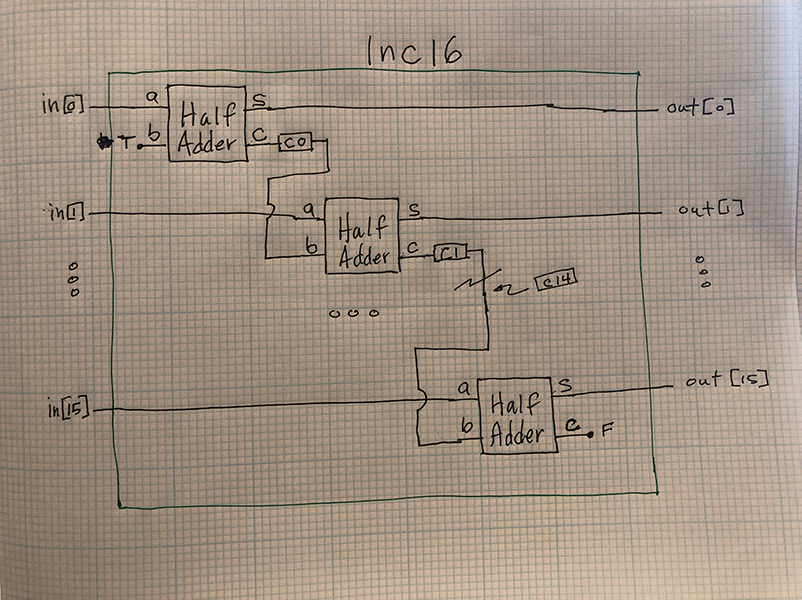
ALU
/**
* The ALU (Arithmetic Logic Unit).
* Computes one of the following functions:
* x+y, x-y, y-x, 0, 1, -1, x, y, -x, -y, !x, !y,
* x+1, y+1, x-1, y-1, x&y, x|y on two 16-bit inputs,
* according to 6 input bits denoted zx,nx,zy,ny,f,no.
* In addition, the ALU computes two 1-bit outputs:
* if the ALU output == 0, zr is set to 1; otherwise zr is set to 0;
* if the ALU output < 0, ng is set to 1; otherwise ng is set to 0.
*/
// Implementation: the ALU logic manipulates the x and y inputs
// and operates on the resulting values, as follows:
// if (zx == 1) set x = 0 // 16-bit constant
// if (nx == 1) set x = !x // bitwise not
// if (zy == 1) set y = 0 // 16-bit constant
// if (ny == 1) set y = !y // bitwise not
// if (f == 1) set out = x + y // integer 2's complement addition
// if (f == 0) set out = x & y // bitwise and
// if (no == 1) set out = !out // bitwise not
// if (out == 0) set zr = 1
// if (out < 0) set ng = 1
CHIP ALU {
IN
x[16], y[16], // 16-bit inputs
zx, // zero the x input?
nx, // negate the x input?
zy, // zero the y input?
ny, // negate the y input?
f, // compute out = x + y (if 1) or x & y (if 0)
no; // negate the out output?
OUT
out[16], // 16-bit output
zr, // 1 if (out == 0), 0 otherwise
ng; // 1 if (out < 0), 0 otherwise
PARTS:
Not16(in=x, out=w1);
Not16(in=y, out=w2);
Mux4Way16(a=x, b=w1, c=false, d=true, sel[1]=zx, sel[0]=nx, out=w3);
Mux4Way16(a=y, b=w2, c=false, d=true, sel[1]=zy, sel[0]=ny, out=w4);
And16(a=w3, b=w4, out=w5);
Add16(a=w3, b=w4, out=w6);
Mux16(a=w5, b=w6, sel=f, out=w7);
Not16(in=w7, out=w8);
Mux16(a=w7,b=w8, sel=no, out=out, out[0]=out0, out[1]=out1, out[2]=out2, out[3]=out3, out[4]=out4, out[5]=out5, out[6]=out6, out[7]=out7, out[8]=out8, out[9]=out9, out[10]=out10, out[11]=out11, out[12]=out12, out[13]=out13, out[14]=out14, out[15]=out15, out[15]=ng);
Or8Way(in[0]=out0, in[1]=out1, in[2]=out2, in[3]=out3, in[4]=out4, in[5]=out5, in[6]=out6, in[6]=out7, out=or8wayout0);
Or8Way(in[0]=out8, in[1]=out9, in[2]=out10, in[3]=out11, in[4]=out12, in[5]=out13, in[6]=out14, in[6]=out15, out=or8wayout1);
Or(a=or8wayout0, b=or8wayout1, out=orout);
Not(in=orout, out=zr);
}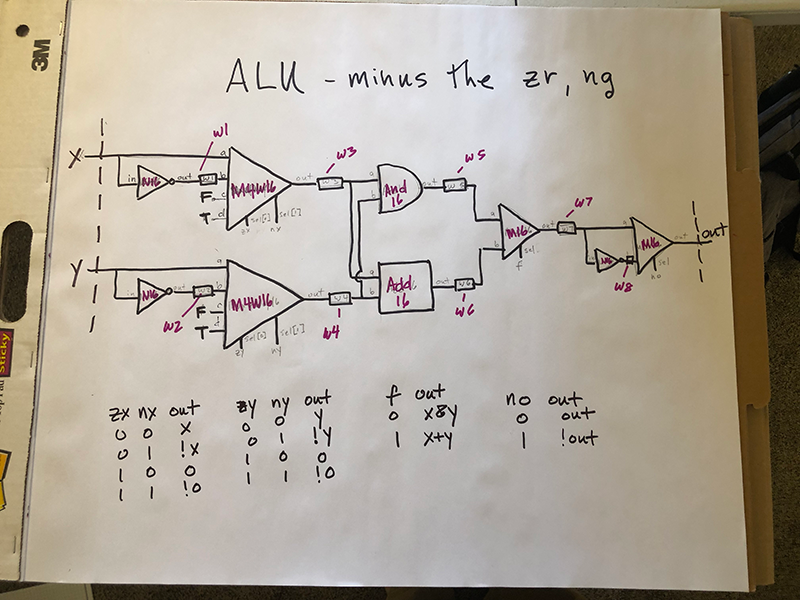


Sequential Logic (8 Gates / Chips)
Bit
/**
* 1-bit register:
* If load[t] == 1 then out[t+1] = in[t]
* else out does not change (out[t+1] = out[t])
*/
CHIP Bit {
IN in, load;
OUT out;
PARTS:
Mux(a=dffout, b=in, sel=load, out=muxout);
DFF(in=muxout, out=dffout, out=out);
}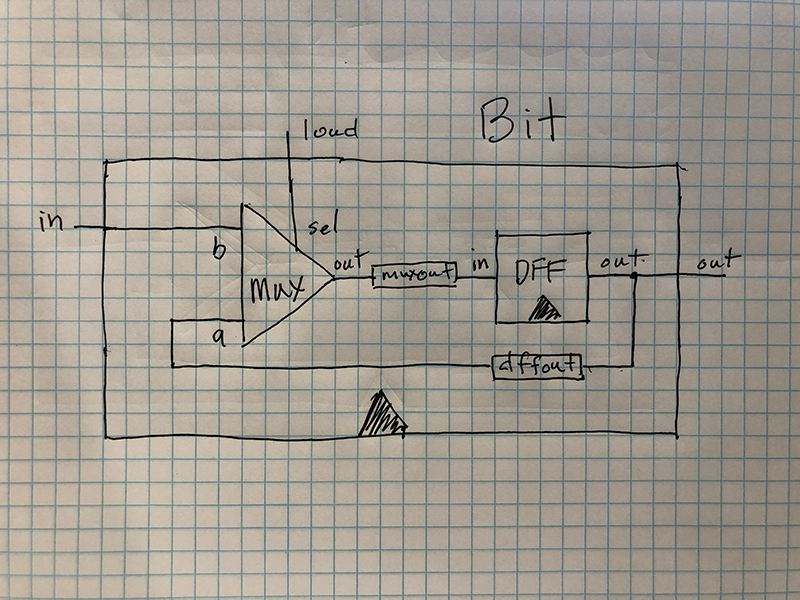
Register
/**
* 16-bit register:
* If load[t] == 1 then out[t+1] = in[t]
* else out does not change
*/
CHIP Register {
IN in[16], load;
OUT out[16];
PARTS:
Bit(in=in[0], load=load, out=out[0]);
Bit(in=in[1], load=load, out=out[1]);
Bit(in=in[2], load=load, out=out[2]);
Bit(in=in[3], load=load, out=out[3]);
Bit(in=in[4], load=load, out=out[4]);
Bit(in=in[5], load=load, out=out[5]);
Bit(in=in[6], load=load, out=out[6]);
Bit(in=in[7], load=load, out=out[7]);
Bit(in=in[8], load=load, out=out[8]);
Bit(in=in[9], load=load, out=out[9]);
Bit(in=in[10], load=load, out=out[10]);
Bit(in=in[11], load=load, out=out[11]);
Bit(in=in[12], load=load, out=out[12]);
Bit(in=in[13], load=load, out=out[13]);
Bit(in=in[14], load=load, out=out[14]);
Bit(in=in[15], load=load, out=out[15]);
}
RAM8
/**
* Memory of 8 registers, each 16 bit-wide. Out holds the value
* stored at the memory location specified by address. If load==1, then
* the in value is loaded into the memory location specified by address
* (the loaded value will be emitted to out from the next time step onward).
*/
CHIP RAM8 {
IN in[16], load, address[3];
OUT out[16];
PARTS:
DMux8Way(
in=load,
sel[2]=address[2],
sel[1]=address[1],
sel[0]=address[0],
a=dmuxout0,
b=dmuxout1,
c=dmuxout2,
d=dmuxout3,
e=dmuxout4,
f=dmuxout5,
g=dmuxout6,
h=dmuxout7);
Register(in=in, load=dmuxout0, out=regout0);
Register(in=in, load=dmuxout1, out=regout1);
Register(in=in, load=dmuxout2, out=regout2);
Register(in=in, load=dmuxout3, out=regout3);
Register(in=in, load=dmuxout4, out=regout4);
Register(in=in, load=dmuxout5, out=regout5);
Register(in=in, load=dmuxout6, out=regout6);
Register(in=in, load=dmuxout7, out=regout7);
Mux8Way16(
a=regout0,
b=regout1,
c=regout2,
d=regout3,
e=regout4,
f=regout5,
g=regout6,
h=regout7,
sel[2]=address[2],
sel[1]=address[1],
sel[0]=address[0],
out=out);
}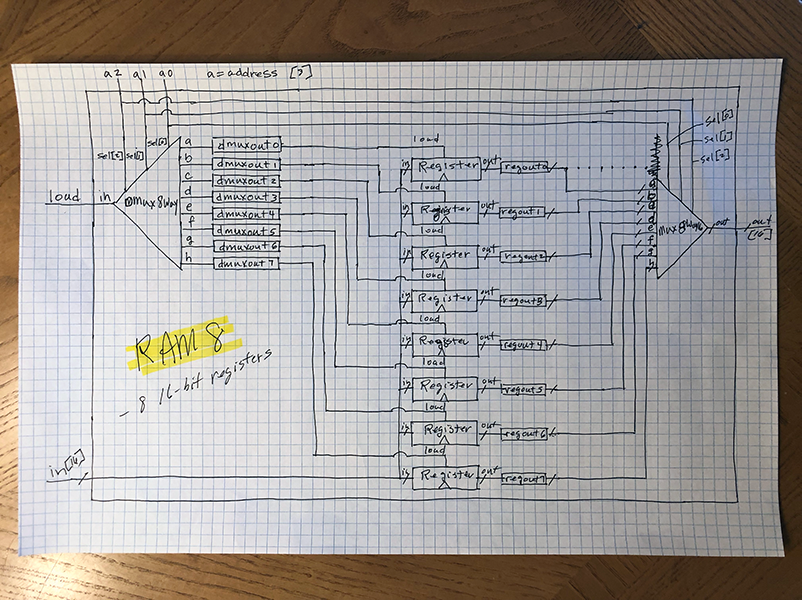
RAM64
/**
* Memory of 64 registers, each 16 bit-wide. Out holds the value
* stored at the memory location specified by address. If load==1, then
* the in value is loaded into the memory location specified by address
* (the loaded value will be emitted to out from the next time step onward).
*/
CHIP RAM64 {
IN in[16], load, address[6];
OUT out[16];
PARTS:
DMux8Way(
in=load,
sel[2]=address[5],
sel[1]=address[4],
sel[0]=address[3],
a=dmuxout0,
b=dmuxout1,
c=dmuxout2,
d=dmuxout3,
e=dmuxout4,
f=dmuxout5,
g=dmuxout6,
h=dmuxout7);
RAM8(
in=in,
load=dmuxout0,
address[2]=address[2],
address[1]=address[1],
address[0]=address[0],
out=ram8out0);
RAM8(
in=in,
load=dmuxout1,
address[2]=address[2],
address[1]=address[1],
address[0]=address[0],
out=ram8out1);
RAM8(
in=in,
load=dmuxout2,
address[2]=address[2],
address[1]=address[1],
address[0]=address[0],
out=ram8out2);
RAM8(
in=in,
load=dmuxout3,
address[2]=address[2],
address[1]=address[1],
address[0]=address[0],
out=ram8out3);
RAM8(
in=in,
load=dmuxout4,
address[2]=address[2],
address[1]=address[1],
address[0]=address[0],
out=ram8out4);
RAM8(
in=in,
load=dmuxout5,
address[2]=address[2],
address[1]=address[1],
address[0]=address[0],
out=ram8out5);
RAM8(
in=in,
load=dmuxout6,
address[2]=address[2],
address[1]=address[1],
address[0]=address[0],
out=ram8out6);
RAM8(
in=in,
load=dmuxout7,
address[2]=address[2],
address[1]=address[1],
address[0]=address[0],
out=ram8out7);
Mux8Way16(
a=ram8out0,
b=ram8out1,
c=ram8out2,
d=ram8out3,
e=ram8out4,
f=ram8out5,
g=ram8out6,
h=ram8out7,
sel[2]=address[5],
sel[1]=address[4],
sel[0]=address[3],
out=out);
}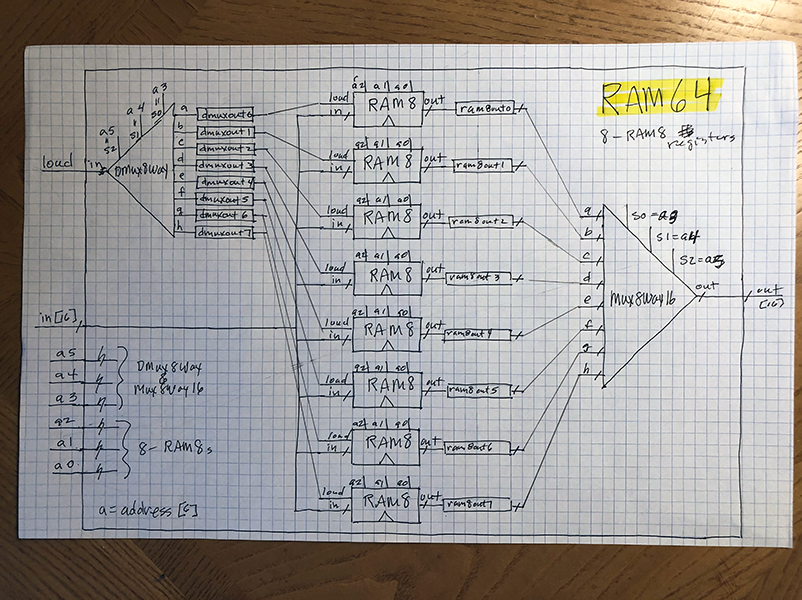
RAM512
/**
* Memory of 512 registers, each 16 bit-wide. Out holds the value
* stored at the memory location specified by address. If load==1, then
* the in value is loaded into the memory location specified by address
* (the loaded value will be emitted to out from the next time step onward).
*/
CHIP RAM512 {
IN in[16], load, address[9];
OUT out[16];
PARTS:
DMux8Way(
in=load,
sel[2]=address[8],
sel[1]=address[7],
sel[0]=address[6],
a=dmuxout0,
b=dmuxout1,
c=dmuxout2,
d=dmuxout3,
e=dmuxout4,
f=dmuxout5,
g=dmuxout6,
h=dmuxout7);
RAM64(
in=in,
load=dmuxout0,
address[5]=address[5],
address[4]=address[4],
address[3]=address[3],
address[2]=address[2],
address[1]=address[1],
address[0]=address[0],
out=ram64out0);
RAM64(
in=in,
load=dmuxout1,
address[5]=address[5],
address[4]=address[4],
address[3]=address[3],
address[2]=address[2],
address[1]=address[1],
address[0]=address[0],
out=ram64out1);
RAM64(
in=in,
load=dmuxout2,
address[5]=address[5],
address[4]=address[4],
address[3]=address[3],
address[2]=address[2],
address[1]=address[1],
address[0]=address[0],
out=ram64out2);
RAM64(
in=in,
load=dmuxout3,
address[5]=address[5],
address[4]=address[4],
address[3]=address[3],
address[2]=address[2],
address[1]=address[1],
address[0]=address[0],
out=ram64out3);
RAM64(
in=in,
load=dmuxout4,
address[5]=address[5],
address[4]=address[4],
address[3]=address[3],
address[2]=address[2],
address[1]=address[1],
address[0]=address[0],
out=ram64out4);
RAM64(
in=in,
load=dmuxout5,
address[5]=address[5],
address[4]=address[4],
address[3]=address[3],
address[2]=address[2],
address[1]=address[1],
address[0]=address[0],
out=ram64out5);
RAM64(
in=in,
load=dmuxout6,
address[5]=address[5],
address[4]=address[4],
address[3]=address[3],
address[2]=address[2],
address[1]=address[1],
address[0]=address[0],
out=ram64out6);
RAM64(
in=in,
load=dmuxout7,
address[5]=address[5],
address[4]=address[4],
address[3]=address[3],
address[2]=address[2],
address[1]=address[1],
address[0]=address[0],
out=ram64out7);
Mux8Way16(
a=ram64out0,
b=ram64out1,
c=ram64out2,
d=ram64out3,
e=ram64out4,
f=ram64out5,
g=ram64out6,
h=ram64out7,
sel[2]=address[8],
sel[1]=address[7],
sel[0]=address[6],
out=out);
}
RAM4K
/**
* Memory of 4K registers, each 16 bit-wide. Out holds the value
* stored at the memory location specified by address. If load==1, then
* the in value is loaded into the memory location specified by address
* (the loaded value will be emitted to out from the next time step onward).
*/
CHIP RAM4K {
IN in[16], load, address[12];
OUT out[16];
PARTS:
DMux8Way(
in=load,
sel[2]=address[11],
sel[1]=address[10],
sel[0]=address[9],
a=dmuxout0,
b=dmuxout1,
c=dmuxout2,
d=dmuxout3,
e=dmuxout4,
f=dmuxout5,
g=dmuxout6,
h=dmuxout7);
RAM512(
in=in,
load=dmuxout0,
address[8]=address[8],
address[7]=address[7],
address[6]=address[6],
address[5]=address[5],
address[4]=address[4],
address[3]=address[3],
address[2]=address[2],
address[1]=address[1],
address[0]=address[0],
out=ram512out0);
RAM512(
in=in,
load=dmuxout1,
address[8]=address[8],
address[7]=address[7],
address[6]=address[6],
address[5]=address[5],
address[4]=address[4],
address[3]=address[3],
address[2]=address[2],
address[1]=address[1],
address[0]=address[0],
out=ram512out1);
RAM512(
in=in,
load=dmuxout2,
address[8]=address[8],
address[7]=address[7],
address[6]=address[6],
address[5]=address[5],
address[4]=address[4],
address[3]=address[3],
address[2]=address[2],
address[1]=address[1],
address[0]=address[0],
out=ram512out2);
RAM512(
in=in,
load=dmuxout3,
address[8]=address[8],
address[7]=address[7],
address[6]=address[6],
address[5]=address[5],
address[4]=address[4],
address[3]=address[3],
address[2]=address[2],
address[1]=address[1],
address[0]=address[0],
out=ram512out3);
RAM512(
in=in,
load=dmuxout4,
address[8]=address[8],
address[7]=address[7],
address[6]=address[6],
address[5]=address[5],
address[4]=address[4],
address[3]=address[3],
address[2]=address[2],
address[1]=address[1],
address[0]=address[0],
out=ram512out4);
RAM512(
in=in,
load=dmuxout5,
address[8]=address[8],
address[7]=address[7],
address[6]=address[6],
address[5]=address[5],
address[4]=address[4],
address[3]=address[3],
address[2]=address[2],
address[1]=address[1],
address[0]=address[0],
out=ram512out5);
RAM512(
in=in,
load=dmuxout6,
address[8]=address[8],
address[7]=address[7],
address[6]=address[6],
address[5]=address[5],
address[4]=address[4],
address[3]=address[3],
address[2]=address[2],
address[1]=address[1],
address[0]=address[0],
out=ram512out6);
RAM512(
in=in,
load=dmuxout7,
address[8]=address[8],
address[7]=address[7],
address[6]=address[6],
address[5]=address[5],
address[4]=address[4],
address[3]=address[3],
address[2]=address[2],
address[1]=address[1],
address[0]=address[0],
out=ram512out7);
Mux8Way16(
a=ram512out0,
b=ram512out1,
c=ram512out2,
d=ram512out3,
e=ram512out4,
f=ram512out5,
g=ram512out6,
h=ram512out7,
sel[2]=address[11],
sel[1]=address[10],
sel[0]=address[9],
out=out);
}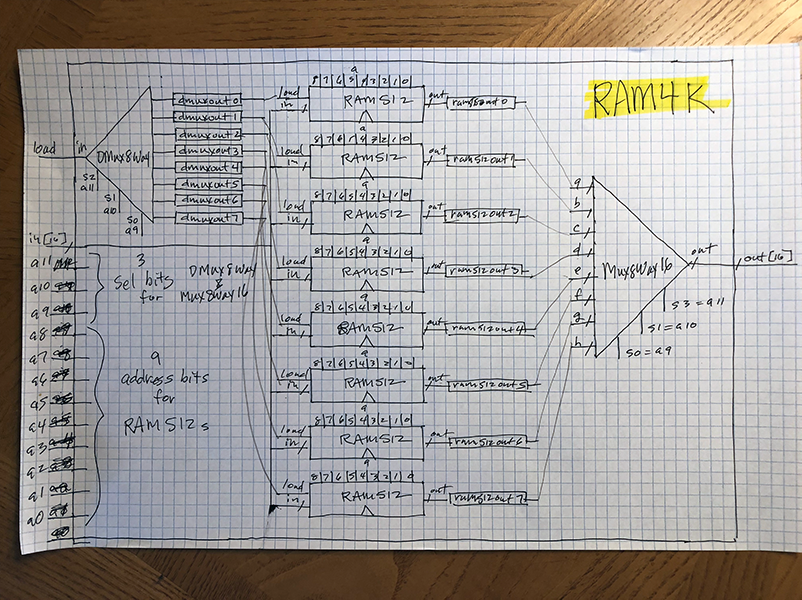
RAM16K
/**
* Memory of 16K registers, each 16 bit-wide. Out holds the value
* stored at the memory location specified by address. If load==1, then
* the in value is loaded into the memory location specified by address
* (the loaded value will be emitted to out from the next time step onward).
*/
CHIP RAM16K {
IN in[16], load, address[14];
OUT out[16];
PARTS:
DMux4Way(
in=load,
sel[1]=address[13],
sel[0]=address[12],
a=dmuxout0,
b=dmuxout1,
c=dmuxout2,
d=dmuxout3);
RAM4K(
in=in,
load=dmuxout0,
address[11]=address[11],
address[10]=address[10],
address[9]=address[9],
address[8]=address[8],
address[7]=address[7],
address[6]=address[6],
address[5]=address[5],
address[4]=address[4],
address[3]=address[3],
address[2]=address[2],
address[1]=address[1],
address[0]=address[0],
out=ram4kout0);
RAM4K(
in=in,
load=dmuxout1,
address[11]=address[11],
address[10]=address[10],
address[9]=address[9],
address[8]=address[8],
address[7]=address[7],
address[6]=address[6],
address[5]=address[5],
address[4]=address[4],
address[3]=address[3],
address[2]=address[2],
address[1]=address[1],
address[0]=address[0],
out=ram4kout1);
RAM4K(
in=in,
load=dmuxout2,
address[11]=address[11],
address[10]=address[10],
address[9]=address[9],
address[8]=address[8],
address[7]=address[7],
address[6]=address[6],
address[5]=address[5],
address[4]=address[4],
address[3]=address[3],
address[2]=address[2],
address[1]=address[1],
address[0]=address[0],
out=ram4kout2);
RAM4K(
in=in,
load=dmuxout3,
address[11]=address[11],
address[10]=address[10],
address[9]=address[9],
address[8]=address[8],
address[7]=address[7],
address[6]=address[6],
address[5]=address[5],
address[4]=address[4],
address[3]=address[3],
address[2]=address[2],
address[1]=address[1],
address[0]=address[0],
out=ram4kout3);
Mux4Way16(
a=ram4kout0,
b=ram4kout1,
c=ram4kout2,
d=ram4kout3,
sel[1]=address[13],
sel[0]=address[12],
out=out);
}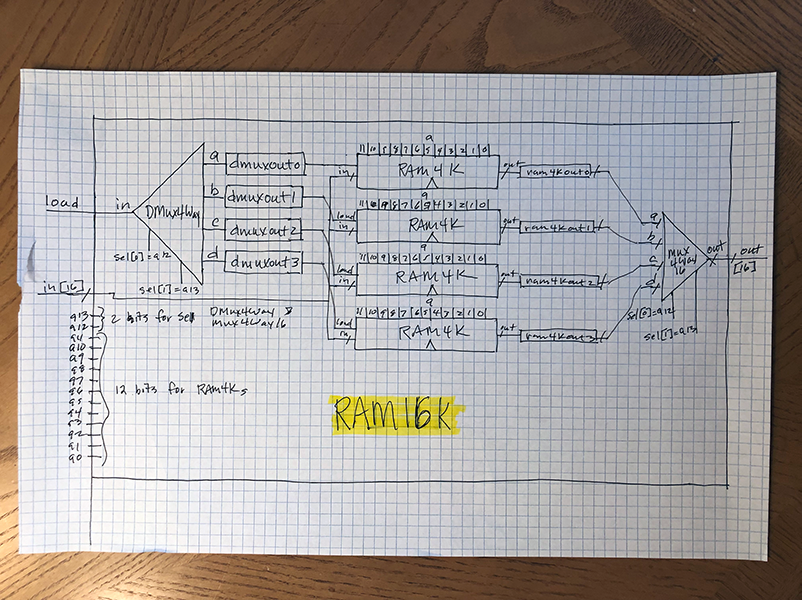
PC
/**
* A 16-bit counter with load and reset control bits.
* if (reset[t] == 1) out[t+1] = 0
* else if (load[t] == 1) out[t+1] = in[t]
* else if (inc[t] == 1) out[t+1] = out[t] + 1 (integer addition)
* else out[t+1] = out[t]
*/
CHIP PC {
IN in[16],load,inc,reset;
OUT out[16];
PARTS:
Inc16(
in=regout,
out=inc16out);
Or( // sel[1]
a=reset,
b=load,
out=orout0);
Or( // sel[0]
a=reset,
b=andout,
out=orout1);
Not(
in=load,
out=notout);
And(
a=notout,
b=inc,
out=andout);
Mux4Way16(
a=regout,
b=inc16out,
c=in,
d=false,
sel[1]=orout0,
sel[0]=orout1,
out=mux4out);
Register(
in=mux4out,
load=true,
out=regout,
out=out);
}
Computer Architecture (3 Chips)
Memory
/**
* The complete address space of the Hack computer's memory,
* including RAM and memory-mapped I/O.
* The chip facilitates read and write operations, as follows:
* Read: out(t) = Memory[address(t)](t)
* Write: if load(t-1) then Memory[address(t-1)](t) = in(t-1)
* In words: the chip always outputs the value stored at the memory
* location specified by address. If load==1, the in value is loaded
* into the memory location specified by address. This value becomes
* available through the out output from the next time step onward.
* Address space rules:
* Only the upper 16K+8K+1 words of the Memory chip are used.
* Access to address>0x6000 is invalid. Access to any address in
* the range 0x4000-0x5FFF results in accessing the screen memory
* map. Access to address 0x6000 results in accessing the keyboard
* memory map. The behavior in these addresses is described in the
* Screen and Keyboard chip specifications given in the book.
*/
CHIP Memory {
IN in[16], load, address[15];
OUT out[16];
PARTS:
// From builtInChips:
RAM16K(
in=in,
load=dmout0,
address[0]=address[0],
address[1]=address[1],
address[2]=address[2],
address[3]=address[3],
address[4]=address[4],
address[5]=address[5],
address[6]=address[6],
address[7]=address[7],
address[8]=address[8],
address[9]=address[9],
address[10]=address[10],
address[11]=address[11],
address[12]=address[12],
address[13]=address[13],
out=ramout);
// From builtInChips:
Screen(
in=in,
load=dmout1,
address[0]=address[0],
address[1]=address[1],
address[2]=address[2],
address[3]=address[3],
address[4]=address[4],
address[5]=address[5],
address[6]=address[6],
address[7]=address[7],
address[8]=address[8],
address[9]=address[9],
address[10]=address[10],
address[11]=address[11],
address[12]=address[12],
out=scrout);
// From builtInChips:
Keyboard(
out=keyout);
// My implementations:
DMux(
in=load,
sel=address[14],
a=dmout0,
b=dmout1);
Mux4Way16(
a=ramout,
b=ramout,
c=scrout,
d=keyout,
sel[0]=address[13],
sel[1]=address[14],
out=out);
}CPU
/**
* The Hack CPU (Central Processing unit), consisting of an ALU,
* two registers named A and D, and a program counter named PC.
* The CPU is designed to fetch and execute instructions written in
* the Hack machine language. In particular, functions as follows:
* Executes the inputted instruction according to the Hack machine
* language specification. The D and A in the language specification
* refer to CPU-resident registers, while M refers to the external
* memory location addressed by A, i.e. to Memory[A]. The inM input
* holds the value of this location. If the current instruction needs
* to write a value to M, the value is placed in outM, the address
* of the target location is placed in the addressM output, and the
* writeM control bit is asserted. (When writeM==0, any value may
* appear in outM). The outM and writeM outputs are combinational:
* they are affected instantaneously by the execution of the current
* instruction. The addressM and pc outputs are clocked: although they
* are affected by the execution of the current instruction, they commit
* to their new values only in the next time step. If reset==1 then the
* CPU jumps to address 0 (i.e. pc is set to 0 in next time step) rather
* than to the address resulting from executing the current instruction.
*/
CHIP CPU {
IN inM[16], // M value input (M = contents of RAM[A])
instruction[16], // Instruction for execution
reset; // Signals whether to re-start the current
// program (reset==1) or continue executing
// the current program (reset==0).
OUT outM[16], // M value output
writeM, // Write to M?
addressM[15], // Address in data memory (of M)
pc[15]; // address of next instruction
PARTS:
ALU(
x=dregout, // D
y=muxamout, // A/M
zx=c1out, // C1
nx=c2out, // C2
zy=c3out, // C3
ny=c4out, // C4
f=c5out, // C5
no=c6out, // C6
out=aluout, // DReg, AReg
out=outM,
zr=zrout,
ng=ngout);
ARegister(
in=muxinstout,
load=aregload,
out=aregout,
out[0]=addressM[0],
out[1]=addressM[1],
out[2]=addressM[2],
out[3]=addressM[3],
out[4]=addressM[4],
out[5]=addressM[5],
out[6]=addressM[6],
out[7]=addressM[7],
out[8]=addressM[8],
out[9]=addressM[9],
out[10]=addressM[10],
out[11]=addressM[11],
out[12]=addressM[12],
out[13]=addressM[13],
out[14]=addressM[14],
out[15]=false);
DRegister(in=aluout, load=dregload, out=dregout);
// Instruction > AReg
Mux16(a=instruction, b=aluout, sel=instruction[15], out=muxinstout);
// A/M > ALU
Mux16(a=aregout, b=inM, sel=instruction[12], out=muxamout);
// Control: dest
// A Reg
Not(in=instruction[15], out=aregloadnot);
And(a=instruction[15], b=instruction[5], out=aregloadand);
Or(a=aregloadnot, b=aregloadand, out=aregload);
// D Reg
And(a=instruction[15], b=instruction[4], out=dregload);
// M Reg
And(a=instruction[15], b=instruction[3], out=writeM);
// Control: c1 through c6
And(a=instruction[15], b=instruction[11], out=c1out); // c1 = zx = instruction[11]
And(a=instruction[15], b=instruction[10], out=c2out); // c2 = nx = instruction[10]
And(a=instruction[15], b=instruction[09], out=c3out); // c3 = zy = instruction[09]
And(a=instruction[15], b=instruction[08], out=c4out); // c4 = ny = instruction[08]
And(a=instruction[15], b=instruction[07], out=c5out); // c5 = f = instruction[07]
And(a=instruction[15], b=instruction[06], out=c6out); // c6 = no = instruction[06]
// Control: jump
// Necessary Not gates
Not(in=instruction[2], out=nj1); // j1
Not(in=instruction[1], out=nj2); // j2
Not(in=instruction[0], out=nj3); // j3
Not(in=zrout, out=nzr); // zr
Not(in=ngout, out=nng); // ng
// Flags
And(a=zrout, b=nng, out=feq); // =
And(a=nzr, b=ngout, out=flt); // <
And(a=nzr, b=nng, out=fgt); // >
// JMP
And(a=instruction[2], b=instruction[1], out=jmp);
And(a=jmp, b=instruction[0], out=jmpout);
// JEQ
And(a=nj1, b=instruction[1], out=jeq0);
And(a=jeq0, b=nj3, out=jeq1);
And(a=jeq1, b=feq, out=jeqout);
// JLT
And(a=instruction[2], b=nj2, out=jlt0);
And(a=jlt0, b=nj3, out=jlt1);
And(a=jlt1, b=flt, out=jltout);
// JGT
And(a=nj1, b=nj2, out=jgt0);
And(a=jgt0, b=instruction[0], out=jgt1);
And(a=jgt1, b=fgt, out=jgtout);
// JGE
Or(a=fgt, b=feq, out=orjgeout);
And(a=nj1, b=instruction[1], out=jge0);
And(a=jge0, b=instruction[0], out=jge1);
And(a=jge1, b=orjgeout, out=jgeout);
// JLE
Or(a=flt, b=feq, out=orjleout);
And(a=instruction[2], b=instruction[1], out=jle0);
And(a=jle0, b=nj3, out=jle1);
And(a=jle1, b=orjleout, out=jleout);
// JNE
And(a=instruction[2], b=nj2, out=jne0);
And(a=jne0, b=instruction[0], out=jne1);
And(a=jne1, b=nzr, out=jneout);
// Or8Way > load
Or8Way(
in[0]=jeqout, // JEQ
in[1]=jltout, // JLT
in[2]=jgtout, // JGT
in[3]=jgeout, // JGE
in[4]=jleout, // JLE
in[5]=jneout, // JNE
in[6]=jmpout, // JMP
in[7]=false,
out=or8wayout);
// Make sure C-instruction & jump = 1
And(a=or8wayout, b=instruction[15], out=loadin);
// Invert for inc bit: if load=1 then inc=0, if load=0 then inc=1
Not(in=loadin, out=incin);
// PC
PC(
in=aregout,
load=loadin,
inc=incin,
reset=reset,
out[0]=pc[0],
out[1]=pc[1],
out[2]=pc[2],
out[3]=pc[3],
out[4]=pc[4],
out[5]=pc[5],
out[6]=pc[6],
out[7]=pc[7],
out[8]=pc[8],
out[9]=pc[9],
out[10]=pc[10],
out[11]=pc[11],
out[12]=pc[12],
out[13]=pc[13],
out[14]=pc[14],
out[15]=false);
}Computer
The only chip that is not in the “THe Hack Chip Set API.md” file. Because this is the end of the API; the computer is not used as a “part” in the N2T project. That’s what there are 38 chips here and 37 in “The Hack Chip Set API.md”.
/**
* The HACK computer, including CPU, ROM and RAM.
* When reset is 0, the program stored in the computer's ROM executes.
* When reset is 1, the execution of the program restarts.
* Thus, to start a program's execution, reset must be pushed "up" (1)
* and "down" (0). From this point onward the user is at the mercy of
* the software. In particular, depending on the program's code, the
* screen may show some output and the user may be able to interact
* with the computer via the keyboard.
*/
CHIP Computer {
IN reset;
PARTS:
// My implementation:
CPU(
inM=memoryout,
instruction=rom32kout,
reset=reset,
outM=outMout,
writeM=writeMout,
addressM=addressMout,
pc=pcout);
// From builtInChips:
ROM32K(
address=pcout,
out=rom32kout);
// From builtInChips:
Memory(
in=outMout,
load=writeMout,
address=addressMout,
out=memoryout);
}